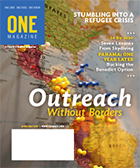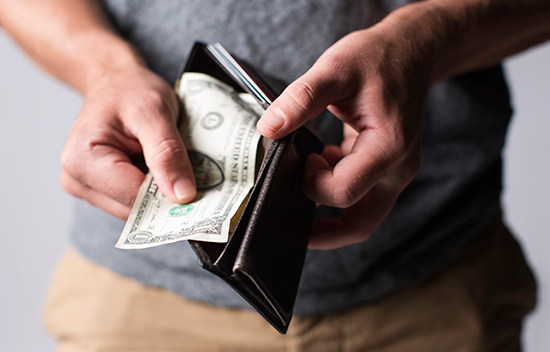
April-May 2016
Outreach
Without Borders
------------------
|






Financial Wisdom From Ecclesiastes
By Brenda Evans
I purposely stumbled into Ecclesiastes late last fall
because I like irony and paradox, and Ecclesiastes
is good for both. The book gets into money, too,
and money is always an interesting subject.
Greater Context
But Ecclesiastes is not easy. I’ll not debate whether Solomon really was the author. Some call the author The Preacher or Koheleth. Others label him Speaker, Debater, Gatherer of God’s People, but I prefer Solomon, probably because I’m used to it. But I also would suggest that, whatever his actual name, this writer rightly could be called The Experiencer, because his voice is not that of a disinterested observer or a reporter outside the action. He’s had “skin in the game” of life. He’s been there, done that. Plus, he’s often as personal as a memoirist about what he’s discovered. I like that.
Solomon’s perspective is all over the place. One moment death is preferable to a miserable life, but the next, living is always better than dying. Money trumps wisdom, but later wisdom trumps everything. It would be hard to live in Solomon’s brain. He turned a thing over and over and over again, especially examining its underside where he found seemingly contradictory principles. He started skeptical about life with its confusions and vanities. But he ended his musings with his feet planted firmly in eternal truth. Our duty, he said at the end, is to “fear God and keep His commandments” (12:13).
All Knotted Up
The in-between passages are relevant, too, where he mused and even brooded over the twists and tangles and knots of our human lives. He was up-front about his own knots as well, that the strands of his life did not always lie neat and untangled on the straight and narrow. Ours don’t either, of course, though, like him, we want them to.
As I read the book, I thought about the old gold and silver necklace I wear every month or so. When I take the necklace off, I carefully lay it in a felt-lined drawer, but next month when I want to wear it again, it’s a tangled mess. All knotted up just from lying there in the drawer. Something weird happens in that drawer, just as it does in life. I don’t purposely bother it; I want it to stay untangled, but it knots up anyway.
Solomon knew about these kinds of vexations. In snatches of narrative throughout his book, he related his quest for answers. It seems like a personal human experiment because he rambled and roiled, tried this, tried that, especially material pleasures. One moment he thought money answered everything. The next, he admitted that when he got it, he still wasn’t satisfied. His eye never had enough, he said (1:8, 5:10, 10:19).
The narrative of his quest that picks up in chapter 2 is especially private, even confessional. He sold himself, he said, to self-indulgence in order to test and see “what was good for the children of man to do under heaven during the few days of their life” (2:3). He drove himself into a pursuit of wealth. His verbs tell the story: “I built...planted...bought...amassed...acquired...whatever my eyes desired” (2:4-10). But his collection of houses, vineyards, land, herds, treasures, slaves, and lovers left him disillusioned and empty. He called the experiment a senseless “striving after wind,” his favorite metaphor for futility (2:11).
His intellectual pursuits fared only slightly better. He found wisdom is better than either folly or wealth. At least a wise man “has eyes in his head,” he said. But even wisdom can’t shield man from death, an event that happens to us all (2:14). And after death, he wrote, we are forgotten—an even greater vanity.
Later, he dug into the troubles that begin when our wealth increases. As I write this, a lottery drawing is pending. In a ticket-buying frenzy, Americans have pushed the take to over $1.6 billion, the largest ever. The media, of course, consider both the frenzy and the take to be top news. One network looked back at five of the top previous winners. Of the five, one still remains anonymous. But three of the other four have been done in by their winnings. Big bucks brought big troubles. Lottery winners declare bankruptcy at twice the rate of the rest of us. But bankruptcy isn’t the worst of it.
Solomon on Wealth & Increase
Solomon must have been prophetic, because in chapter 5 his findings about wealth sounded like that lottery newscast: sleeplessness, excess, discontent, fretting, fear, hoarding, bad investments, loss, and shame. Trouble, trouble, trouble! I’m not going to win the lottery because you know the saying, “You have to buy a ticket to win.” But the truth is, Solomon said plenty of things that apply to me anyway—to all of us—not just to those of us whose “goods increase” suddenly because we have won the lottery or received a big inheritance. He warned we must guard our hearts and minds whenever and however our “goods increase” (5:11).
Four of his comments on what happens “when goods increase,” as he called it, are just as relevant today as they were two millennia ago. First, when goods increase, so do the number of hands reaching out to grasp and consume them—more money, more spending, more bills, more “friends” with their hands out. I think Solomon had a sardonic grin on his face when he said that the only advantage to an increase is seeing a bigger number on the paycheck when it passes from our hand to the bank teller (5:11).
Second, when goods increase, so does sleeplessness (5:12). In Ecclesiastes: Ancient Wisdom When All Else Fails, T. M. Moore reminded readers that when wealth grows, worrying and fretting often grow as well over additional debts, how investments will turn out, or whether we’ll have enough money left “to get a little more.”
Third, when goods increase, so does the opportunity to hoard (5:13). Greed is sin. It is holding our goods close, not letting go (3:6). We American Christians buy or build closets, sheds, garages, carports, outbuildings, barns, and storage units to store all our stuff, much of which we never use or even remember we have. I know from experience. Last summer, we moved to downsize and downsized to move. Both. I felt reproved and shamed at all I had hoarded for no reason except the pleasure of having it…another way of saying greed. Much of it could have been helping others, and now I’m working on that.
Fourth, when goods increase, so does the opportunity to launch unwise ventures, hide money under the table away from Uncle Sam’s eyes and taxes, or bury it so we won’t lose it (5:14). Anything to keep it and gain more!
Solomon held up a mirror to our hearts and our goods. He showed what money does and doesn’t do; how we earn it, view it, and use it. And when he came to his final word on his human experiment, his quest to test what was good for the children of man, he gave us a bottom-line warning: we will give an accounting for what we have and what we do with it. “For God will bring every deed into judgment, with every secret thing, whether good or evil” (12:14). And that’s the bottom line.
About the Writer: Brenda Evans is a freelance writer who lives in Ashland, Kentucky. Learn more at www.fwbgifts.org.
|
|

